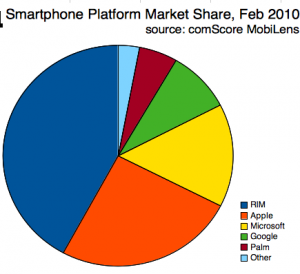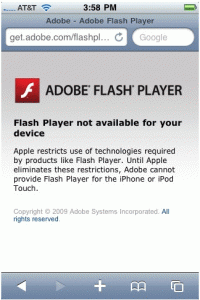Last week, Steve Jobs let loose with a scathing statement on why Apple mobile products (the iPod Touch, iPhone, and iPad) will never use Flash. Consisting of six points detailing why this is, and repeating it several times, it reads a little like Dr. Seuss’s Green Eggs and Ham.
It should come as no surprise, then, that Adobe has reportedly filed a complaint against Apple under US antitrust law. The New York Post reports that the Federal Trade Commission and the Department of Justice are currently trying to decide who would handle the antitrust probe. If it turns out to be the DOJ, Apple could eventually be fighting criminal penalties under the Sherman Antitrust Act. Either way, such an inquiry is bound to drag on for years.
Let’s put our personal feelings about Apple and Adobe aside for the moment: Adobe is claiming that Apple is engaging in unfair, anticompetitive practices by refusing to support its products on its mobile platforms. What Adobe would need to prove is that Apple is seeking to establish a monopoly, or that it is unfairly blocking competition.

So, is Apple seeking to establish a monopoly? Well, as of February, Apple had managed to capture only 25% of the smartphone market share in the US. That doesn’t sound like a very secure monopoly. The iPhone is clearly behind RIM’s ubiquitous BlackBerry, and faces competition from devices running on Google’s Android platform, not to mention a well-established base of Palm products. It’s still a competitive field, with plenty of room for everyone. Adobe makes it sound like Apple’s the only game in town, when they’ve already made plans to roll out Flash and AIR to Google Android devices.
People are already comparing Apple’s impending situation with the 1998 Microsoft antitrust suit. Then, the accusation was that Microsoft, by shipping Internet Explorer with every copy of Windows, was making it very difficult, on purpose, for Netscape (the dominant web browser at the time) to compete. That doesn’t sound like what’s going on here; rather, Apple is declining to take the extra business that Adobe claims Flash would bring them.
It’s almost as if Adobe wants Flash to be the new IE: an unmarketable product riding on the back of a successful one. It certainly can’t survive on its own.
If Flash were as intrinsic to the mobile web experience as Adobe claims it is, Apple’s decision not to support it would be suicide—as opposed to an attempt to establish a monopoly. Adobe would also be too busy rolling out Flash support to the three-quarters of smartphones that are not made by Apple to worry about it.
But that’s not the case, because Steve Jobs is right. Flash is too bulky, too bloated, and too processor-hungry to be anything but a drain on the iPhone platform. Mac and PC (Windows, Linux, or otherwise) users already know that Flash is a processor hog, and the quickest way to crash your browser (Mac users: keep Activity Monitor open; if Safari freezes, you can kill the Flash plugin independently and keep working), or worse, hang your entire system. Can you imagine what that would do to a small, battery-powered device?

The problem with Flash (and AIR) now is the same as the problem with Java in the 1990s. Being portable across every system, especially when real-time graphics are involved, means taking advantage of as much processor power as you can grab. These software technologies were all designed in the hopes that hardware would evolve to run them without choking. But Apple’s business model isn’t planned obsolesence; they want the iPhone you buy today to still be useful three years from now. With Flash installed, it wouldn’t even still be useful today.
Antitrust laws exist to protect the consumer from one company forcing another company’s competing product off the market through unfair practices. Adobe’s having trouble keeping Flash competitive (or even relevant) as it is. They’re resorting to the last-ditch tactic of trying to get Flash onto the iPhone and iPad by legal decree, rather than on its own merits.
That’s dirty pool.
It would be a gross misuse of public funds for either the FTC or the DOJ to treat this complaint as anything but the nuisance action it is. Adobe, for their part, should pour less resources into fighting with Apple and concentrate on reworking Flash and AIR so that they are marketable products.

Dear Adobe: when you’ve been standing on the highway for this long with your thumb out and nobody has stopped to pick you up, you should realize that you’re not getting a free ride, and it’s time to start walking.






